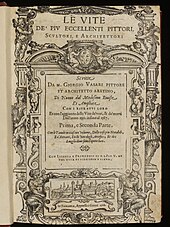Vita

A Vita ( f , from Latin vita 'life', pl. Vitae, Viten) is generally the literary description of the life of a well-known personality and belongs to the literary genre of biography . Traditionally, ancient and medieval biographies are called vitae (or vitae ). The saints' lives are a common form .
Use of language
While in more recent linguistic usage a vita can be limited to the simply documented résumé - the Duden defines, for example, an educational use for “life, résumé, life story of a person” - in the past the main function of most vitae was more like a laudation in emphasizing the Virtues of their heroes and less in a historically reliable description of life. They should give the readers or listeners moral guidance for their own lives or underpin certain values.
history
In antiquity there were initially vites of philosophers and writers , later the vites mainly described the lives of generals and statesmen. The word Vita appears for the first time in the work De viris illustribus by Cornelius Nepos . Plutarch's depictions of Greek and Roman statesmen and Suetons De vita Caesarum had an important influence on the development of the literary form .
Build on the ancient scheme in the Middle Ages one hand Fürstenviten such as Einhard Vita Karoli Magni (830) or a Vita Emperor Charles IV. On the other hand, saints and Märtyrerviten as the Vita Sancti Martini of Sulpicius Severus or Vita Benedicti Gregory the Great .
Examples
- A source of historiography that has been used since the Middle Ages is hagiography , which deals with the transmission of the way of life of saints.
- A special form of the writing of vitals that is centered on the life of grace in the sense of mystical spirituality is the grace vita , which was mainly used in women's monasteries in the first half of the 14th century.
- In the late Middle Ages and in the Renaissance , artists 'works were also produced again, such as Giovanni Boccaccio's The Life of Dante (around 1360) or Giorgio Vasari's Le Vite de' più eccellenti pittori, scultori et architettori ... (1568).
- The Vita experienced a late bloom in the 15th and 16th centuries in the Orthodox Eastern European area, where it had, among other things, the task of giving high representatives of church and state an aura of holiness and divine grace and thus consolidating their position of power in the state (→ Muscovite Period of Old Russian Literature ).
See also
- Biography research
- Curriculum vitae
- Vita activa
- Vita contemplativa
- Category: Hagiography - Saints' lives (examples)
Web links
Individual evidence
- ↑ Vita, the. In: duden.de , accessed on August 6, 2016